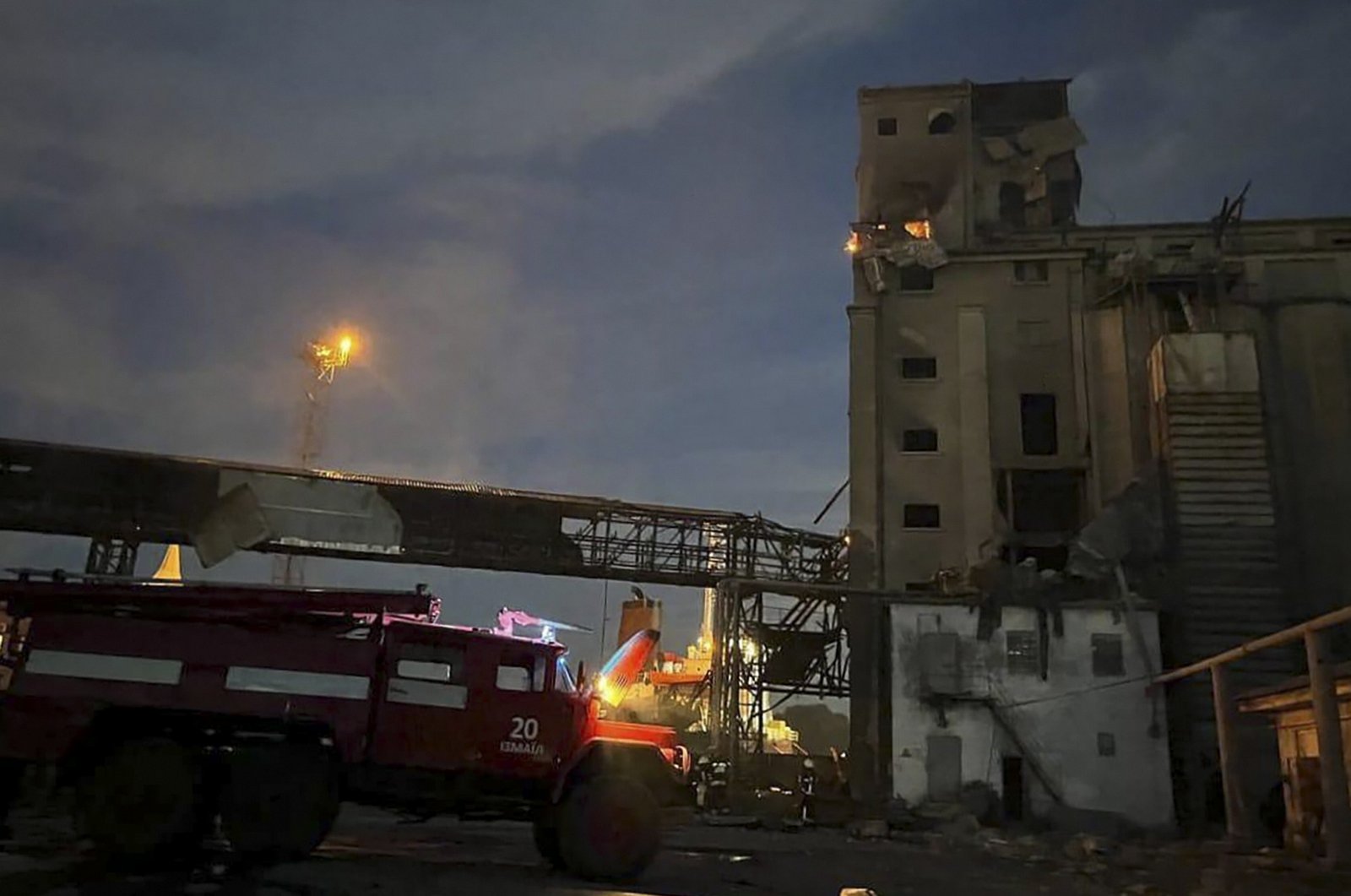
Russia attacked Ukraine's grain ports in the early hours of Wednesday, including an inland port across the Danube River from Romania, sending global food prices soaring as it ramps up its use of force to prevent Ukraine from exporting grain.
The attacks destroyed buildings in the port of Izmail and halted ships in their tracks as they prepared to arrive there to load up with Ukrainian grain in defiance of a de-facto blockade Russia reimposed in mid-July.
Commercial ship tracking data showed dozens of international ships halting and dropping anchor at the mouth of the Danube, many of them registered to arrive in Izmail from the Black Sea in an apparent bid to open a breach in Russia's blockade.
The port, across the river from NATO-member Romania, is the main alternative route out of Ukraine for grain exports, since Russia's blockade halted traffic at Ukraine's Black Sea ports in mid-July.
Video released by the Ukrainian authorities showed firefighters on ladders battling a huge blaze several stories high in a building covered with broken windows. Several other large buildings were in ruins, and grain spilled out of at least two wrecked silos.
Two industry sources told Reuters operations at the port were suspended. Seaport authority head Yuriy Lytvyn said on Facebook that repair work had already begun and the port infrastructure continued to operate.
There were no reports of casualties, Odessa region governor Oleh Kiper wrote in a post on the Telegram messaging app.
"Unfortunately, there are damages," President Volodymyr Zelenskyy said on Telegram. "The most significant ones are in the south of the country. Russian terrorists have once again attacked ports, grain, global food security."
Chicago wheat prices rose by nearly 5% following the attack and were still up 1.2% at $6.60 a bushel by 1119 GMT due to concern about a hit to global supplies from driving Ukraine, one of the world's top exporters, off the market.
Russia has relentlessly attacked Ukrainian agricultural and port infrastructure for over two weeks, since refusing to extend an agreement that had lifted its war-time blockade of Ukrainian ports last year. Moscow has demanded better terms for its own food and fertilizer exports, which are already exempt from international financial sanctions.
Moscow has described its attacks as retaliation for a Ukrainian strike on a bridge to Crimea, used to supply its troops in southern Ukraine.
"The enemy... is trying to destroy Ukrainian grain, attacking industrial and port infrastructure. Unfortunately, there are hits, unfortunately, the silo was damaged, and fires broke out at the site," Serhiy Bratchuk, spokesperson for the Ukrainian Volunteer Army South, part of Ukraine's armed forces, said in a video statement.
"Russia is trying to cut Ukraine out of the future grain agreement and, most importantly, to strategically displace our country from the global food market," he said.
U.S. Ambassador Bridget Brink condemned the attacks in a statement, listing recent Russian targets: "Homes. Ports. Grain silos. Historic buildings. Men. Women. Children.
"Round-the-clock and intensifying Russian strikes on Kryvyi Rih, Kharkiv, Kyiv, Kherson make it clear once again Russia has no desire for peace, no thought for civilian safety, and no regard for people around the world who rely on food from Ukraine."
Kyiv says the goal of the strikes is to reimpose Russia's blockade by persuading shippers and their insurance companies that Ukrainian ports are unsafe to resume exports.
"It is the enemy's priority to convince the international community and shipowners in particular that ... navigation in the direction of Ukrainian-controlled ports is dangerous," said Natalia Humeniuk, military spokesperson in southern Ukraine.
Producers in Ukraine are already feeling the impact. Kees Huizinga, a farmer in Ukraine's central Cherkasy region told Reuters: "Because of the shelling a direct consequence to our farm is that we can not deliver 700 tons of contracted barley which we were supposed to deliver today".
Ukraine's Danube river ports such as Izmail accounted for around a quarter of grain exports before Russia pulled out of the Black Sea deal, and have since become the main remaining route out, with grain loaded onto barges and shipped to Romania's Black Sea port of Constanta for shipment onwards.
Kyiv's goal is for international ships to go straight there and load up directly and on Sunday, Ukrainian media reported several foreign cargo ships had arrived at Izmail from the Black Sea, for the first time since the expiry of the grain deal.
The United Nations has warned of a potential food crisis and hunger in the world's poorest countries as a result of Russia's decision to abandon the deal, brokered by the U.N. and Türkiye.
Moscow says it will treat ships heading to Ukrainian seaports as potential military targets. Kyiv has said it hopes ships will return anyway, but so far they have not done so.
As a result of the deal's collapse midway through July, Ukraine's grain exports for the month were down 40% from June, analysts said on Tuesday. Russian drones already targeted Izmail once before in late July, destroying grain warehouses.
Ukrainian officials have said Moscow has hit 26 port facilities, five civilian vessels and 180,000 tonnes of grain in nine days of strikes since quitting the grain deal. Moscow has said such attacks are retribution for a Ukrainian strike on a bridge that Russia uses to supply its occupation army in southern Ukraine.
Ukraine's Air Force reported that Russia also launched a drone attack on Kyiv and the surrounding region overnight. Air defense shot down 23 drones, but debris from downed drones damaged several buildings in the capital and the region. No casualties were initially reported.
